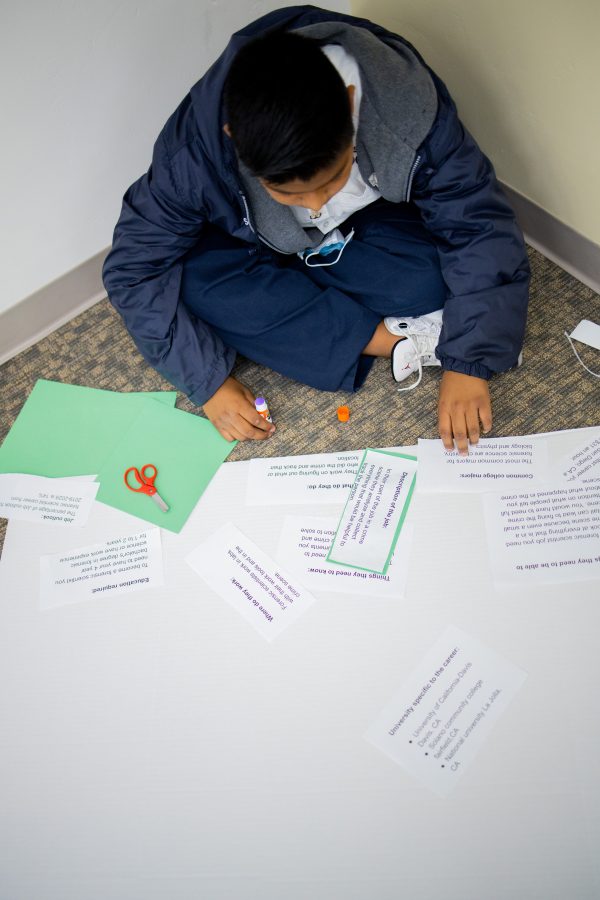
Research Hub
Understanding the nuanced needs of income eligible, first generation college students is critical to our success at Nativity Prep Academy. First-generation college students (FGCS) are those students whose parents lack a four-year college degree (University of California definition). At Nativity Prep Academy, all of our students meet this qualification.
According to the U.S. Department of Education (2015-16), 56% of students qualify as first generation college students. In the United States, 60% of FGCS identify as Hispanic or Latinx. Supporting those students who qualify as FGCS is critical because:

How can we improve outcomes for First-Generation College Students?
- Mentors and career resources can play an important role in helping these students develop cultural and social capital for career readiness and transition, even for the most motivated FGCS.
- Students may benefit from living and learning communities, co curricular programs, summer bridge programs, and high-impact practices to expand on classroom instruction (Kuh, 2008). Examples include writing-intensive instruction, study abroad and study away programs, and internships, among others.
- Those serving FGCS should address imposter syndrome from an individual and institutional level and dispel the common fears that FGCS may have about being in a higher education setting.
- Faculty and staff serving FGCS must recognize the intersections of identity, including race, gender, and socioeconomic status and avoid treating the experiences of FGCS as monolithic.
- FGCS benefit from support services for their families. This includes addressing “family achievement guilt” or a sense of “other,” coupled with pride and high expectations for academic achievement and college success in FGCS. Because a student’s family defines first-generation status, the role of their family is an important component for their success.
- A significant barrier to student success for FGCS is lack of engagement in institutional support services. This reticence generally originates from a combination of historically poor support from other major institutions throughout their lives, fears around the potential repercussions of asking for help, and a lack of awareness about the existence of university resources and services.
- To augment the success of first-generation students, especially outside of the classroom, university staff need to be proactive in reaching out to students, as opposed to waiting for students to find services.
- Faculty and staff in institutions serving FGCS ought to provide professional development in the nuanced needs of FGCS’ and develop mentoring strategies that will best meet student needs.
At Nativity Prep, we seek to mitigate the challenges facing FGCS by implementing research-based best practices as part of an 11 year commitment to our students and their families. These include:
- A.M.I.G.O.S. Mentoring Program
- Graduate Support Program
- High school scholarships
In addition to supporting our current students, alumni and their families, we seek to be a resource for our community and those institutions to which NPA students matriculate. Our library of resources includes research-based, best practices to support income eligible, first generation college students.

Best Practices and Recommendations:
- An Examination of the Impact of Peer Mentoring on First-Generation College Student Peer Mentors’ Development of the Five Practices of Exemplary Leaders
- Best Practices to Support FGCS
- Big Enough to Bother Them? When Low-Income, First-Generation Students Seek Help From Support Programs
- Communicative Resilience of First-Generation College Students During the COVID-19 Pandemic
- Decoding the Hidden Curriculum: Latino/a First-Generation College Students’ Influence on Younger Siblings’ Educational Trajectory
- Experiences of Successful First-Generation College Students With College Access
- Feeling Like An Imposter
- First-Generation College Students and Family Support: A Critical Review of Empirical Research Literature
- From “First in Family” to “First to Finish”: Does College Graduation Vary by How First-Generation College Status Is Defined?
- "You Never Become Fully Independent": Family Roles and Independence in First-Generation College Students
- Understanding the Self-Regulated Learning Characteristics of First-Generation College Students
- The Lived Experiences of First-Generation College Students of Color Integrating into the Institutional Culture of a Predominantly White Institution
- “We Belong Here”: Identities, Family, Sense of Belonging, and Persistence in Latinx First-Generation College Students’ Educational Journeys
- “Since I Am From Where I Am From”: How Rural and Urban First-Generation College Students Differentially Use Social Capital to Choose a College Major
- Experiences That Support Persistence and Retention of Latinx First-Generation College Students (FGCS) at Community Colleges
- ¡Pertenecemos y tenemos importancia aquí! Exploring Sense of Belonging and Mattering for First-Generation and Continuing-Generation Latinx Undergraduates
- Spiritual and Religious Support for Underrepresented First-Generation, Low-Income (UFGLI) Students
- Stressed but not Depressed: A Longitudinal Analysis of First-Generation College Students, Stress, and Depressive Symptoms
- Student experiences of the COVID-19 pandemic: Perspectives from first-generation/lower-income students and others
- The Lived Experiences of First-Generation College Students of Color Integrating into the Institutional Culture of a Predominantly White Institution
- The relationship of mentoring on sense of belonging, self-efficacy, and student perception of mentorship in first-generation college students
Resources for High Schools:
- Bridging the Gap: Academic Preparation and Postsecondary Success of First-Generation Students
- Breaking Down Barriers: Understanding Hispanic High School Students’ Perceptions on the Transition to College
- Bridging the gap: academic preparation and postsecondary success of first-generation students
- College Prep for First-Generation Students: Two high schools with different strategies to support students who will be the first in their families to go to college.
- First generation college students at Penn State weigh in on high school preparation for college
- Prospective first-generation college students: meeting their needs through social cognitive career theory
- Safety and school choice: What first-generation college students say would have better prepared them for college, according to new poll
- Transitioning to College: Experiences of Successful First-Generation College Students
Other Resources:
- Center for First Generation Student Success
- Defining First Generation Students
- First Generation: Blazing the Trail
- First-Generation College Graduates’ Transition to Graduate School and Employment
- First Generation College Student Experience at University of San Diego
- First-Generation Students College Access, Persistence, and Postbachelor’s Outcomes
- First-Generation Student Success at San Diego State University
- Students whose parents did not go to college
- Supporting First-Generation Students at UC San Diegox
- The Cost of Being First
- University of California #FirstGen
- Using Data to Improve Outcomes for First-generation College Students: A Guide for Practitioners


